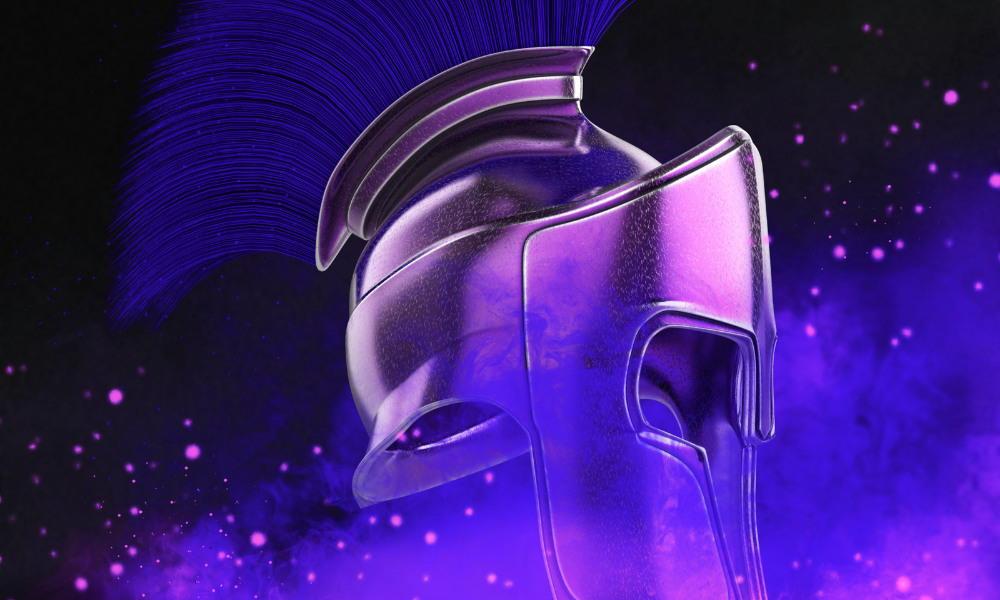Finalist in Voyage’s First Chapters Contest for Women Writers
.
Thalia,
The Athenian traitor will dine with us tomorrow night. I’m eager to hear him speak. You tease me for my interest in Athens, but Laconia can learn a lot from the world beyond our mountain walls. They say Alcibiades is a master of philosophy and poetry—that he was Socrates’ most brilliant pupil. Of course, our instructors just want the man to talk about naval strategy. Hopefully, he’ll have something more interesting to share.
Either way, it’ll be a welcome break from being thrown to the skamma floor a hundred times in succession, which is how I was supposed to spend the afternoon. We’ll be let out early from wrestling practice to clean the syssition. The instructors seem eager to give a good impression. As long as it keeps me from more bruises, I am all for it.
I’ll try to sneak out to your chariot trials sometime in between. Either way, we can celebrate your victory together at the Festival of Leto. I know you will win. Just try not to battle with Mother today, or she may lock you away again and you won’t get to compete.
May the gods be merciful.
.
Leo
.
Chapter 1
.
Father hadn’t come.
I didn’t truly expect him to. He rarely attended my competitions, aside from wrestling championships where I always defeated the girls in my year-class. At those he would stand beside me, his shoulder against mine, the proud parent accepting laurels on behalf of the champion he had raised. I knew that chariot team tryouts, with no guarantee of victory, were not impressive enough to draw him here.
Still, disappointment knifed my heart as I looked around me. Not even Leo had made it. Other girls’ parents and siblings filled the stands. They stamped their feet and cheered, shouting the names of my competitors, urging them on as they prepared their horses. We even had a royal audience: Cynisca, our king’s sister and a great charioteer herself, had come to observe.
I returned my gaze to my own chariot. Perhaps none of them had come to watch me. But by the end of this race, they would all know my name.
I secured my feet to the braces of my two-wheeled chariot. Win or lose, crash or stumble, I’d stay in place. A charioteer never abandoned their rig, no matter how dangerous. Most Grecians were too cowardly to practice the sport themselves for that reason. They let slaves drive instead, risking their lives for the glory of their masters.
We Spartiates didn’t fear death.
“Thalia, take the second lane.” Mistress Matraxia directed each of us from her platform. Our racing instructor was very tall, with a stern face and arms as broad as a man’s. Her plain gray chiton hid her well-muscled thighs, the ones I’d seen clamped to horseflesh as she galloped down the track hands-free. She was the strongest woman I knew. She had trained Cynisca, who graduated from our gymnasion seven years earlier, and I wanted to train with her more than anything.
I snapped the leather reins to guide my well-trained horses into lane two. My competitors readied their whips and focused on the course before us. Our gymnasion’s racetrack was smaller than the Hippodrome, so today’s contest was divided into heats of four drivers apiece. The last two girls from each heat would be eliminated.
The stands quieted. A gentle wind, graced to us by the Anemoi, tickled my neck and gave me goosebumps. This was what I loved. Even the anticipation was delicious. Soon I’d be speeding down the track, fast as Hermes, the wind in my hair and the power of the horses under my control. There was nothing like it.
Great Artemis, let me get there first, I prayed. I will win this in your honor, or not at all.
“Go!”
The starting flag dropped. I snapped my reins. The chariot burst into motion as my horses leapt forward. I grinned, crouched to keep my balance, and before I knew it, I had nearly reached Demetra, the charioteer in the first lane. I needed to pull into that lane in order to beat her. On my other side, I heard the galloping of my best friend Leda’s horses as she fought to catch up. I lashed my horse’s hides to keep them from slowing. I crouched lower, face into the wind, flattening my back.
My team had just passed the wheels of Demetra’s chariot when we reached the first turn. I couldn’t let her get any further ahead.
Desperate, I spurred my horses on faster through the curve. It was a quick, and risky, way to gain distance. Most people held steady or slowed during turns, as most crashes happened there. But I’d practiced this enough with my horses, and we came through it safely—and in line with Demetra.
With each lap and turn, I gained more. Leda’s team was stuck behind me, no longer a threat, and a quick glance showed me that the fourth driver had fallen out of it altogether. And Demetra was slowing. She turned her head and her face creased in anger as I began to pull ahead. She whipped and shouted at her horses. But she’d already pushed them too hard and they didn’t have the energy to speed up. I eased ahead of Demetra in the last circuit. One more turn and I’d pull in front of her.
I was going to win.
“Hah!” I cried, lashing my horses again. My blood was pumping. My vision narrowed in on the path ahead as we neared the last turn. I was almost there.
A red cloak flapped in the breeze. Apollo’s light glinted off of an iron blade.
Don’t look.
Don’t look. Don’t look. It’s not him.
Fighting the temptation was like swimming against a current. I tried to keep my head forward, to focus on completing the turn and reaching the clear, open road to the finish. But I had to know. Inexorably, I turned my head.
A man in military uniform stepped up into the stands, making his way towards Cynisca. The man was blond, not dark-haired. It wasn’t Father.
My horses stumbled and took the curve wildly, jerking the chariot underneath me. I caught myself on the crossbar as we veered sideways. The reins flew from my hand. We stuttered unevenly through the turn.
It was a disaster. Behind me, Leda screamed with joy. Demetra launched forward, shooting great clouds of dust into my face. And then Leda shot past me.
I slowed my horses to get them back in sync. I cracked the whip until they strained at their bits, pushing them as we sought to make up time. We chased Leda and Demetra down the straightaway.
“Faster!” I screamed.
The wind tore tears from my eyes. I breathed hard, wet with sweat, my arms aching. My knees shook. But I was getting closer. My team and I were flying, now. We pulled up past the wheels of Leda’s chariot. I held my horses steady and straight as I drove them with my whip.
We soared past the final flag.
I screamed in frustration and eased back on the reins. My horses slowed to a stop. I rested my head on the crossbar, my bones still rattling from the motor memories of the race.
The race was over. I’d lost.
I pounded my fist on the crossbar.
“Excellent race!” Mistress Matraxia was saying. “Good effort, all of you!”
I let out a heavy breath. I didn’t want to look at her or the other girls. Demetra would lord this over me for years, having endured seeing my name written on the Wall of Victors so many times. And I could not think of facing Leda. Leda, who only began driving chariots after I dragged her into it. Leda, whom I’d beaten many, many times in practice. Chariot racing was my dream, and now she’d enjoy it without me.
But I smiled and cheered for the eight girls who would advance. I patted Leda on the back when she approached, her face full of apology, and told her I was happy for her.
Good Spartiates didn’t succumb to jealousy. Winners were to be held up, adored, imitated. Losers had to shut up and work harder.
The Artemis Aiginaia gymnasion was one of only two in all of Laconia—in fact, in all the world—that trained girls to race chariots. Those who made our team were the most accomplished athletes of their age. Like Cynisca. I wanted so badly to follow in her footsteps.
I wasn’t good enough.
I took my time in going home.
For the past year, I’d practiced almost daily on the chariot, sometimes with Leda, sometimes driving on my own. I’d been diligent and determined, and sure—so certain—that I could do this. Chariot racing wasn’t some pleasurable hobby for me. It was my destiny.
Once, while practicing in the fields behind our villa, a stag had crossed my path. Instead of shying away, he shadowed my chariot across the field, as though wishing to race me. Finally, without notice, he darted back into the woods. It was an omen. Everyone knew that Artemis drove a chariot pulled by golden-horned deer. She’d sent me the stag as a message that I was destined to race chariots. She wanted me to honor her with glory.
I wasn’t giving up.
There was one other girl’s chariot team. The Hippodamia gymnasion’s trials would take place in two months, right before graduation, and were open to anyone in Sparta. Their team was not as skilled or prestigious as ours, and they didn’t have Mistress Matraxia, but it was the last chance open to me.
I’d keep practicing until then. And I wouldn’t let anything distract me.
I turned onto the road leading home, and found Mother there, waiting for me.
“You can leave that chariot there,” she said, folding her arms.
She stood before the villa like a nymph queen. Her golden silk peplos hung off of her broad shoulders in waves, darting through with streaks of silver along the folds. Her short blonde hair was arranged in twists secured with pins, far more elegant than any Spartiate woman ought to wear, but Mother and her friends never worried about that sort of thing. Nor did anyone dare to challenge them.
I pulled my weary horses to a stop.
“I understand you lost today,” she said, with rather less satisfaction than I expected from her. She wasn’t even smirking. But then, as much as she hated my chariot racing, losing was always shameful.
“You are well-informed,” I said.
“What I am is patient,” she said. “Your father said we ought to allow this racing nonsense, and I conceded. Now there is no point. I’ve already begun discussions about marrying you to Antikles’s son. I will accelerate that conversation. I want you out of this house and moved in with them as soon as you graduate.”
My heart thudded. Antikles was a loud, disgusting brute, and one of Mother’s best friends. I hated the way he looked at me. I hated everything about him. He was close with both kings and headed the krypteia, the secret branch of our army that patrolled Laconian land and kept the helots in line. An alliance with him would likely benefit Mother and Father.
His son was an idiot who did whatever his father bade, drank and fought with his hoplite brothers, and by all accounts spent his free days with prostitutes. Despite his influential family, he’d never be a great man. I couldn’t imagine wedding, or bedding, him. And if all that weren’t enough, Leda was in love with him.
“I’m only seventeen,” I stammered. Most girls didn’t marry until twenty. “And—and I thought to try out for the Hippodamia chariot team.”
Mother shook her head and then smiled, a stomach-turning sight.
“Orestes,” she called.
The door behind her opened wider. I drew in a sharp breath as my mind began spinning. Was he there? Had he been listening all this time?
A boy with sun-browned skin and thick, dark hair emerged to stand just behind Mother. Orestes was our stable boy. He was a helot servant with a lame foot and a talent for taming horses. He waited with his hands folded.
He did not look at me. I knew better than to expect anything from him, even as little as a smile. I’d put him in his place long ago. The days of our friendship—or anything more—were ancient history.
“Orestes, take Thalia’s chariot and drive it to the port. There is a Cretan merchant vessel expecting their arrival.”
She’d sold them.
She’d been threatening to do it since I started chariot racing. Every time I bruised or scraped myself, she complained I would turn off potential husbands. She said I was better off attending parties with her than playing with horses. But she’d never gone through with it.
“Mother,” I said, my voice jarring against the awful word.
“It’s all done, Thalia. Step down from there and let Orestes do as I say.”
I didn’t move. I couldn’t. It was as though I’d met a Gorgon’s gaze. My hands tightened on the reins.
“Mistress Astera, the horses will be tired,” Orestes said quietly. “It might overtax them to bring them down to the port.”
Warmth spread through my veins like wine. My heart pounded ferociously, and again I felt as though the world had shaken. Was he defending me? Or did he protest only for the horses’ sake? I stared at him, trying to understand, but his expression was still that familiar blank, respectful stare helots and slaves often wore. I could not read him at all.
Mother unhooked the short wooden staff she carried on her belt.
“Wait.” The word slipped out of me.
She paused.
“What’s that, Thalia? Something to say?”
My mind reeled. Anything I said would only make her punishment worse. Orestes had objected to her command, she was therefore entitled to discipline him, and if I tried to stop her she would take it as a sign of weakness—or worse, affection. Even the hint of that was unforgivable. She’d made sure I learned that lesson.
“No.”
She bashed Orestes on his head twice. With each hit, his eyes and mouth squeezed tight with pain. But he stood tall. He squared his shoulders and hooded his eyes, staring at the ground. He took it as well as any Spartiate.
When we were young, before Leo left for agoge, the three of us used to traipse up and down the countryside, playing at heroes and voyagers and hunters. One summer day we followed a hunting party into the woods. I was eager to see an arrow tear through the hide of a lynx or deer. But our little legs could not keep up with the men, and we soon found ourselves alone, pretending to hunt our own prey.
We were all surprised when a little brown weasel poked its head out beneath a mulberry tree right at our feet.
Orestes pounced first. He caught the animal in his hands and raised it excitedly as Leo and I crowded close. It bared its sharp, tiny teeth at us, futilely, and as it writhed in panic, I saw it was white on the bottom, its fur fine and smooth when I stroked it.
“I’ll find a rock so we can kill it,” I said eagerly.
“We could cut it open and study its innards,” Leo suggested.
Before either of us could act, Orestes crouched and let the creature go. I had howled with fury. I hurled every insult at him I could think of, robbed of my first successful hunt. But Orestes simply laughed, ran and dived into the swimming hole nearby, and dared us to catch him. He wasn’t afraid of us, and he wasn’t ashamed of his own softness. I never understood how he struck that balance.
Now, Mother affixed the wooden rod back to her hip.
“If the chariot and horses do not arrive at their destination on time, I will hold you responsible, Orestes,” she said. She went back inside and closed the doors behind her.
Then it was just me and Orestes outside the villa. It was very quiet. Dusk was approaching. If he did not deliver my horses to the Cretan merchant, Mother would punish him far worse than she had today.
He kept his gaze down.
I made myself climb from the rig. I left the reins dangling over the side. He stepped up to take them, and as he pulled his crooked foot into the chariot, I felt the heat from his body and wondered if he felt it, too. In a moment, it was gone. He drove off without a word. I watched until the road bent and carried them out of sight.




